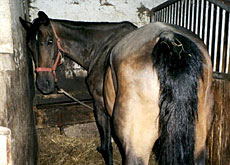
Rough ride for Swiss horses

Thousands of Swiss horses are being kept in miserable conditions, according to Switzerland's largest animal rights organisation.
Swiss Animal Protection (SAP) claims that many horses are being neglected both by their owners and by Swiss law.
“The Federal Veterinary Office only produces guidelines for how horses should be kept,” explains SAP spokesman Mark Rissi. “Unlike with other farm animals, there are no binding laws related to the keeping of horses.
“The cantonal vets who control the farms are quite willing to work with the guidelines, but because they are not legally enforceable, the vets can only talk to the farmers and try to convince them to improve their stables.”
Failing
So far, SAP believes that approach is failing. Launching their campaign for tighter legislation in horse-ownership, the organisation’s officials argued that the basic needs of horses were being ignored on many Swiss farms.
Describing horses as sociable and highly mobile animals, SAP vet Cynthia Lerch said that more than 80 per cent of Switzerland’s horses were being kept in solitary or near-solitary conditions. According to SAP figures, 60 per cent are confined in a living area of just ten square metres, while 20 per cent still spend their days tethered up.
“People abroad still seem to have a positive perception of what Swiss farms look like,” says SAP chairman Hans-Ulrich Huber, “and I think many cattle and pig farms have made great progress recently in living up to that perception. But Switzerland’s 50,000 horses have been forgotten – they just don’t have any legal protection”.
In the introduction to its guidelines on keeping horses, Switzerland’s federal veterinary office openly admits that there are indeed no binding regulations other than the general laws pertaining to all animals.
Improvements
However veterinary office spokesman Hans Wyss believes Swiss Animal Protection is underestimating the improvements which the guidelines have already brought to the husbandry of horses.
“I am convinced that the horse-owners want to keep their horses in the right manner,” argues Wyss, “and I see the situation getting better every year. As well as the guidelines, we have produced special information booklets and videos for horse-owners and we think the first step is to get the message across and then give the farmers time to adopt the guidelines.
“I don’t think it’s reasonable to expect these sort of changes in a matter of two or three years. Our aim is to see the guidelines being put into full practice within the next eight years or so. Certainly by then, no-one will be able to say that they hadn’t been told about the best way to keep horses.”
Unsurprisingly, the horse-owners themselves seem more in agreement with the timeframe set by the veterinary office. Luc Jallon of the Franches-Montagnes breeders association insists that overly swift modernisation of the country’s horse farms could have disastrous effects on an already-suffering rural economy.
Struggling farmers
“Our farmers are already struggling under piles of regulations which they are trying to adapt to while simultaneously battling against financial difficulties,” Jallon told swissinfo.
“We also see the guidelines as an opportunity to improve the situation,” Jallon insists, “and we have conducted our own surveys which show how much has already changed. Some 20 per cent of horses may still be tethered, but less than six years ago it was around 50 per cent.”
Those changes don’t appear to be coming fast enough however for Swiss Animal Protection which has already launched a people’s initiative aimed at improving animal rights across the board in Switzerland.
With the Swiss parliament also due to discuss possible changes to animal protection law this year, SAP officials say they are saddling up to improve the lives of Switzerland’s horses – and at a gallop rather than a trot.
swissinfo, Mark Ledsom in Zurich
Swiss Animal Protection (SAP) argues that horses’ needs are being neglected because federal veterinary office guidelines are not binding on horse-owners. SAP claim that 80 per cent of Swiss horses are kept in solitary or near-solitary housing and that 20 per cent are kept tethered. The organisation has launched a people’s initiative aimed at improving animal rights across the board.

In compliance with the JTI standards
More: SWI swissinfo.ch certified by the Journalism Trust Initiative




























You can find an overview of ongoing debates with our journalists here . Please join us!
If you want to start a conversation about a topic raised in this article or want to report factual errors, email us at english@swissinfo.ch.